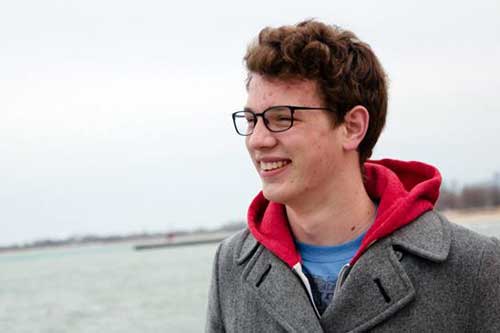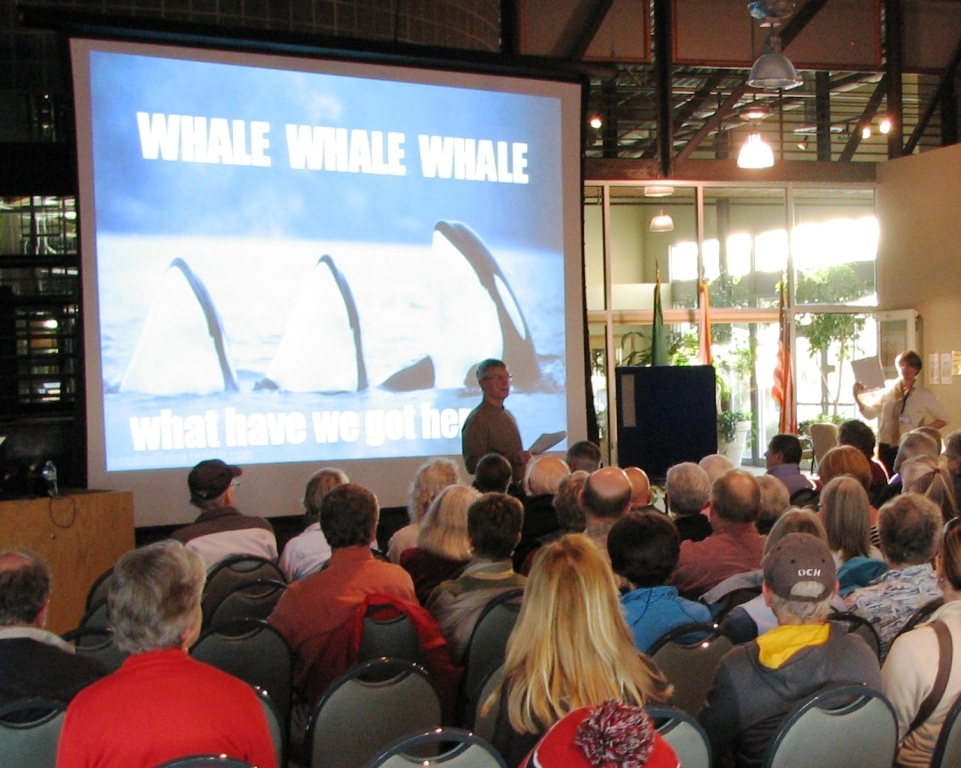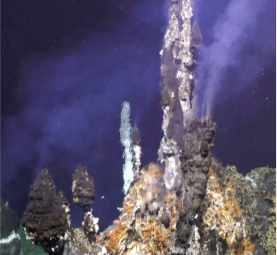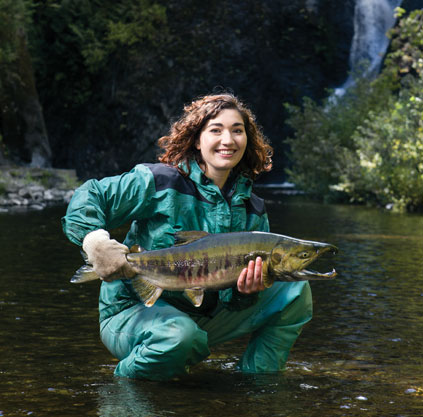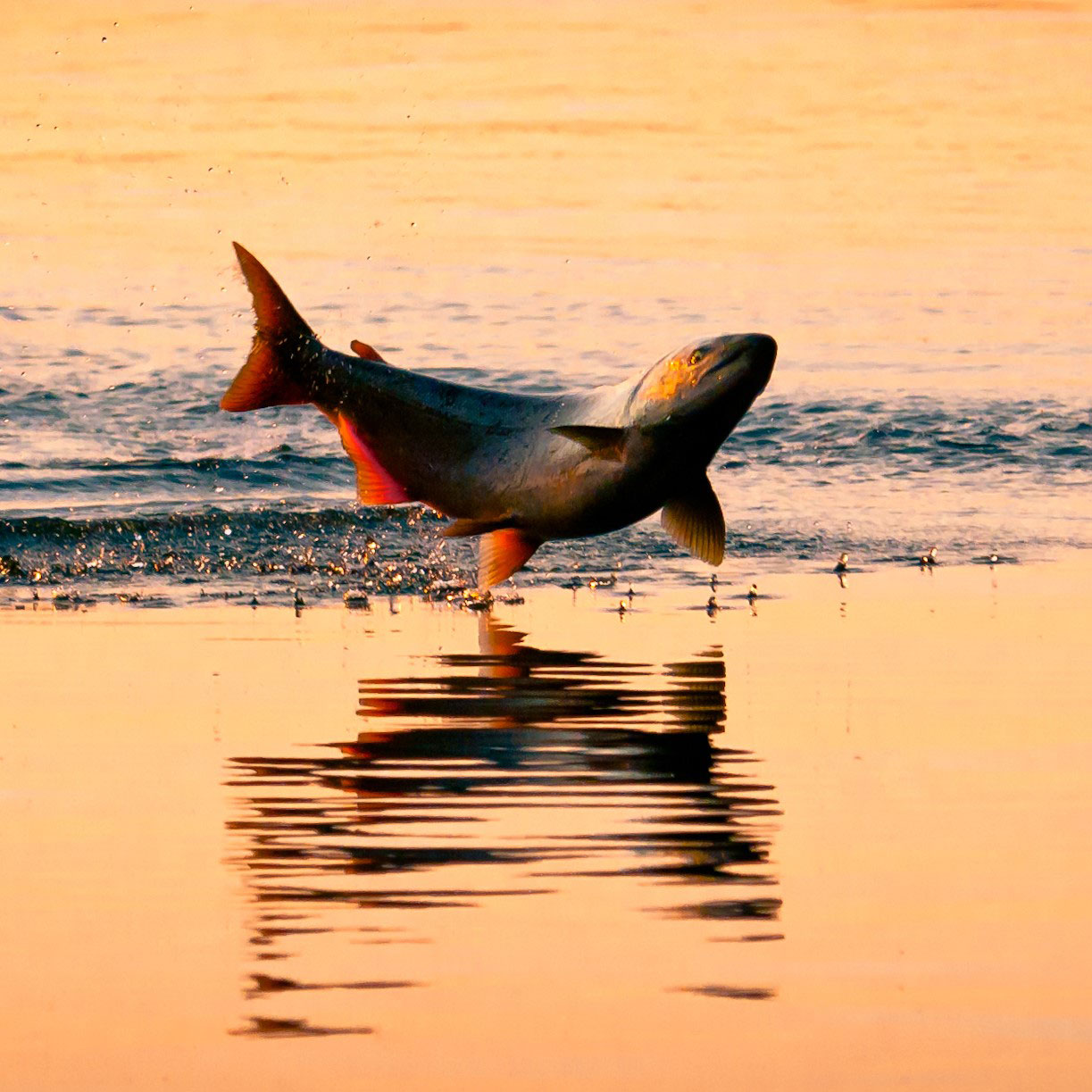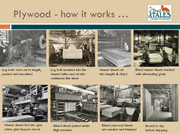Stormwater Monitoring Project
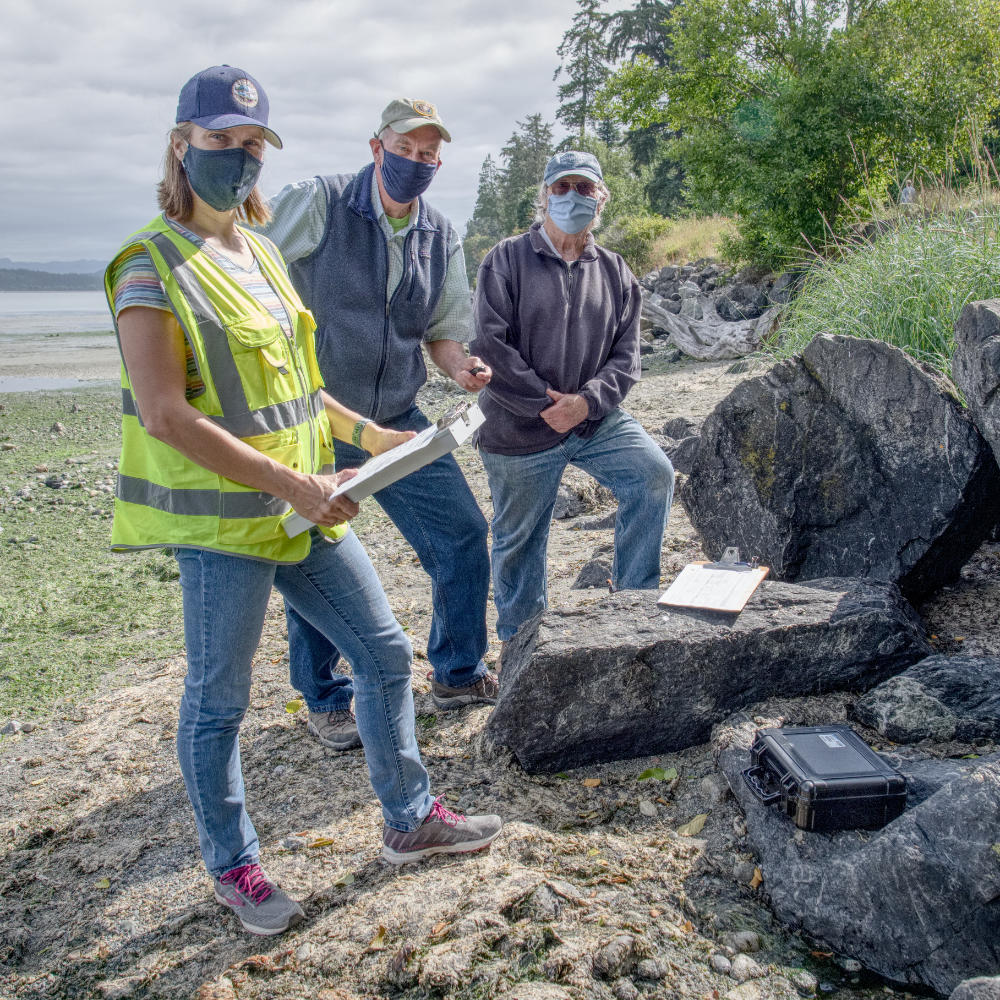
Objective:
To measure how much pollution from stormwater actually washes into Puget Sound from streets and lawns of Anacortes.
This project will have approximately twenty citizen science volunteers who will work about 2 hours each per month in the data gathering process. A volunteer, or team of two volunteers, are assigned 5 outfalls to take water samples from and measure with laboratory water quality equipment. The state Department of Ecology has established safe limits on all six measurements. Volunteers will measure the water samples and record the results.
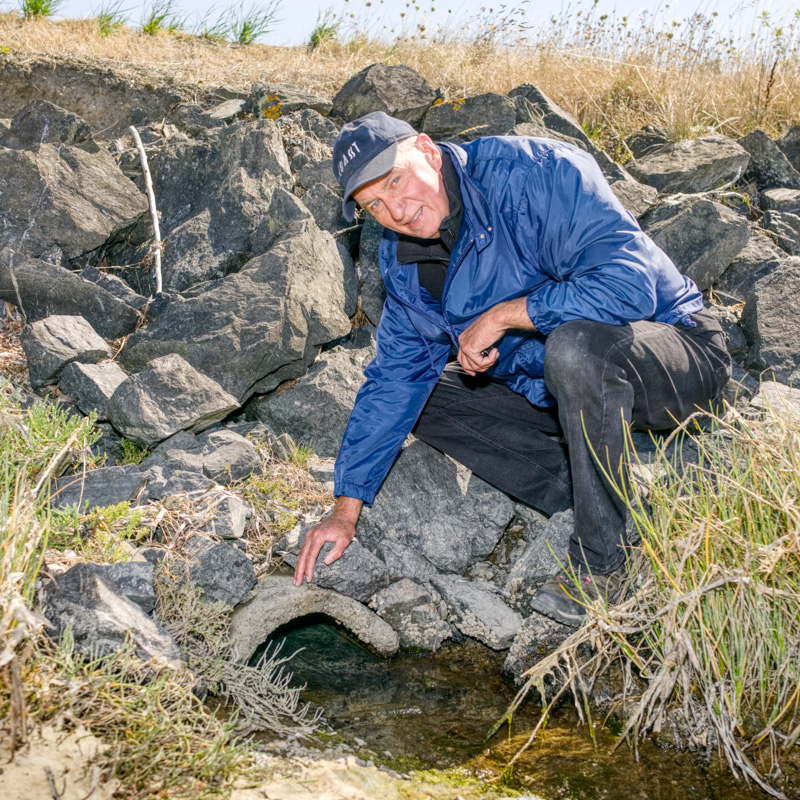 If a stormwater outfall exceeds any of the State limits the volunteer notifies the City of Anacortes Stormwater Manager, Diane Hennebert. She will engage the City's Public Works department in finding the source of the pollution.
If a stormwater outfall exceeds any of the State limits the volunteer notifies the City of Anacortes Stormwater Manager, Diane Hennebert. She will engage the City's Public Works department in finding the source of the pollution.
After two years of gathering data, a picture of the types of pollution and their concentration levels was created. A website displaying data for the monitored outfalls (49 or 79) in the City of Anacortes has been created and is available to the public to see the pollution levels and types. Visit our Anacortes Stormwater website to see a map of locatoins and details about the results of monitoring.
Key Friends of Skagit Beaches members involved with project:
Betty Carteret: Succeeded in acquiring a $20,000 Rose Foundation grant to fund the water quality equipment and data analysis. Good ideas run on money and Betty skillfully presented this citizen science project to a funding source who specializes in developing this very kind of idea. Betty with assistance of Tim and Wayne has successfully received a second $74,000 grant from the National Fish and Wildlife Foundation to expand this project to three additional communities in the North Sound region of the Washington coast.
Wayne Huseby: Managing the project organization. Wayne has past experience managing complex projects so objectives are met in the intended timeframe. Wayne also organizes the database for this project's large volume of water quality measurements.
Tim Gohrke: Leading the volunteer recruitment and training component of this project. This project has a technical component that requires the volunteers to follow an exacting process for data accuracy in the water quality measurements. Tim works with the volunteers to assure they have the tools, training, and understanding for gathering stormwater data.
Our Dedicated Volunteers:
Our trained team of 18 volunteers has braved all sorts of weather, day and night, to monitor 49 of the 79 stormwater outfalls in the City of Anacortes. Their work has identified a number of problem locations that the City is now evaluating. Two locations have resulted in filing of official illicit discharge complaints that are being addressed by the WA Dept. of Ecology along with the businesses involved.
Assistance and Training Support:
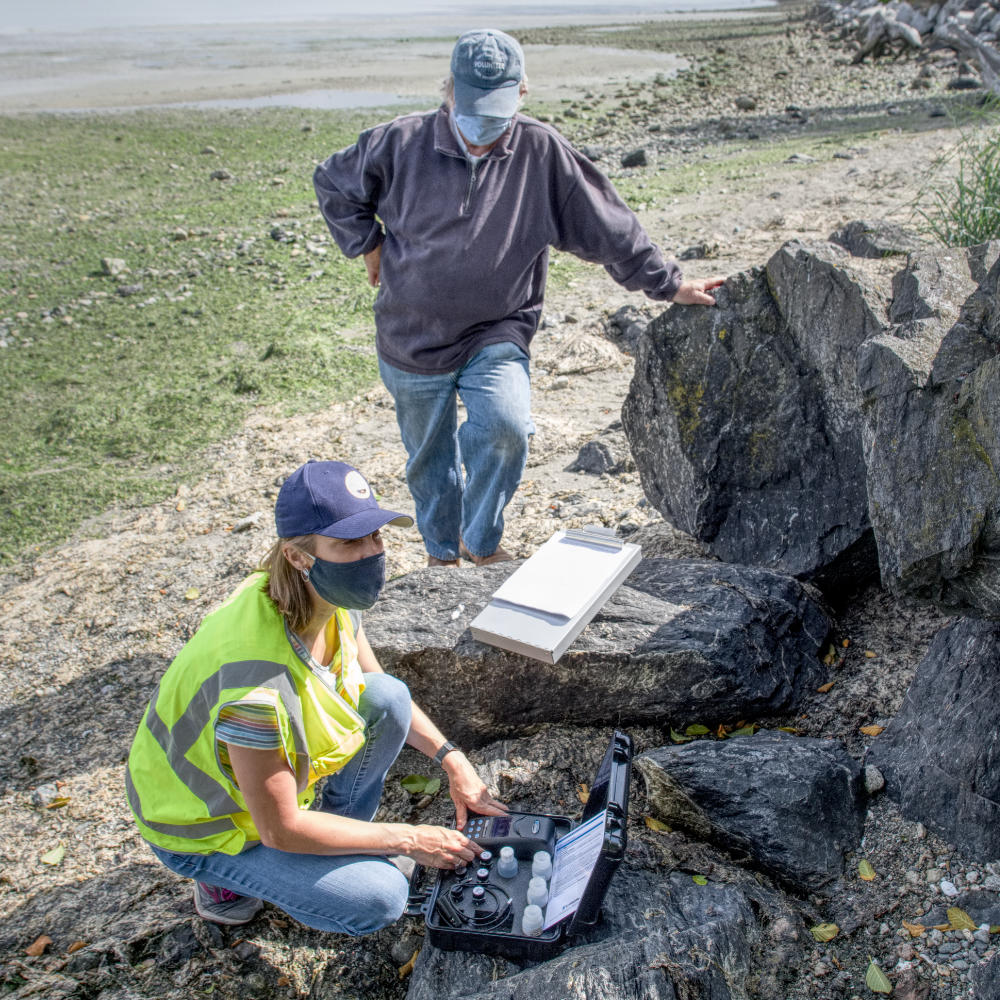 Diane Hennebert: Stormwater Manager for City of Anacortes. Diane provides the scientific background related to water quality. She basically tells us the meaning behind the measurements we take.
Diane Hennebert: Stormwater Manager for City of Anacortes. Diane provides the scientific background related to water quality. She basically tells us the meaning behind the measurements we take.
Todd Woodard: Director, Natural Resources Department, Samish Nation. Todd helps us understand how to organize the large body of data we collect. He recommended the equipment we purchased and the maintenance approach for this sensitive laboratory equipment. A benefit of his involvement is that our data is harmonized with the stormwater data his department gathers on a monthly basis. Between the Samish Nation and City of Anacortes stormwater outfalls a majority of Fidalgo Island stormwater is monitored with matching data types and techniques.
Sarah Wheatley: Manager, Natural Resources Department, Samish Nation. Sarah helps us with calibration and training for our laboratory equipment. If Todd Woodard helps us understand what's to be done for water quality monitoring, Sarah shows us how to do it.
Project Size and Scope:
79 stormwater outfalls dot the shoreline within the city limits of Anacortes. These outfalls are the point where the freshwater meets the saltwater of Puget Sound. An a once-per-month basis these outfalls will have their stormwater measured for:
-
Fecal coliform -- fecal material from man or animals that is picked up in stormwater can cause bacterial diseases in marine animals and shellfish.
-
Dissolved Oxygen -- is a measure of the marine life supporting properties of water. Too low of a dissolved oxygen level can suffocate marine life and too high a level causes gas bubble disease in marine animals.
-
pH -- a measure of the acidity of the stormwater. This measurement can indicate a pollution source within the stormwater drainage area.
-
Temperature -- is stormwater warmer in temperature than ambient air? A sign of a polluting source chemical reaction.
-
Turbidity -- An indicator of silt in the stormwater from land erosion. This silt will harm the reproduction cycle for marine fish.
-
Conductivity -- is a measurement of the presence of inorganic dissolved solids such as chloride, nitrate, sulfates, or sodium, magnesium, calcium, iron, and aluminum. These chemicals can come from fertilizers or industrial processes and have a harmful effect on marine life.
What does this look like for our volunteers?
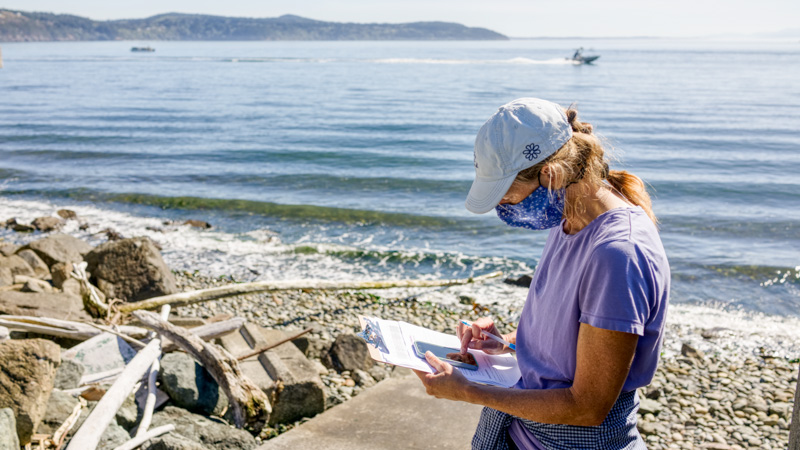 During half the year, the cold and rainy half, most of the water samples will be gathered at night. Many of the City's stormwater outfalls are fully exposed at only around low tide. During the winter this is usually at night and there is a 50/50 chance it will be raining and cold.
During half the year, the cold and rainy half, most of the water samples will be gathered at night. Many of the City's stormwater outfalls are fully exposed at only around low tide. During the winter this is usually at night and there is a 50/50 chance it will be raining and cold.
The volunteers will scramble over wet rocks and mud to reach these outfalls. They will capture about a pint of stormwater, insert the lab equipment probes into this water sample, then record the meter's readings onto their data worksheet on a clipboard. Likely it is raining and their flashlights will illuminate the steam from their breath.
Then the volunteers will proceed to four additonal outfalls and repeat the process. Finally they will return to our small make-shift laboratory and enter their data into a computer. They will clean the lab equipment and pack it away for the next volunteer who starts their monthly measurement process the next day.
These volunteers will provide a reliable picture of how polluted our Anacortes stormwater is.
Are you interested in learning more? Send us an email at This email address is being protected from spambots. You need JavaScript enabled to view it.
Plastic Reduction
Skagit Plastic Reduction and Recycling Coalition (SPRRC)
Friends of Skagit Beaches - in partnership with Skagit County Solid Waste Division and the Skagit Marine Resource Committee's Salish Sea Stewards volunteer program - has undertaken a new project to provide education and outreach to residents of Skagit County to reduce single-use plastics that can find their way into our waterways and become marine debris, a major issue threatening our bays and oceans. Another major focus for SPRRC is educating residents on changes in recycling guidelines for plastics. We appreciate grants provided by the Washington Dept. of Ecology, Northwest Straits Foundation, and Anacortes Soroptimists that have made this work possible.
It's here! Our 2023 Edition of "Beyond the Bin Recycling Guide" for Skagit County with active hyperlinks to URLs listed in the booklet.
Dive in and explore by clicking the book below. Select two-page view from the popup window menu (three dots) at the top right for the best user experience.
The title "Beyond the Bin" is a good description of the information provided in this guide. There are often many items we would like to recycle or repurpose that are not permitted to be put into our recycling bins. Think of those gently used household items that you no longer need but someone else would just love to find at a local thrift store. This guide provides information about a wide variety of items that can be taken to outlets in or near Skagit County instead of throwing out to the landfill. The guide is designed in three sections, first, Part 1 is an A - Z listing of items that can be recycled and what business outlets they can be taken to. Second, Part II is a detailed alphabetical listing of all the outlets included in Part 1 with information on their location, hours, phone number or website and other details. Lastly, Part III provides a listing of municipal and county resources for waste disposal and recycling.
We think you'll find this guide very useful, so check it out by viewing the here. Check your local public library for copies. Need help finding a copy of the guide? Email us at This email address is being protected from spambots. You need JavaScript enabled to view it. and we'll help you get one.
Avoid throwaway living and recycle right!
Read more about how we created this project here!
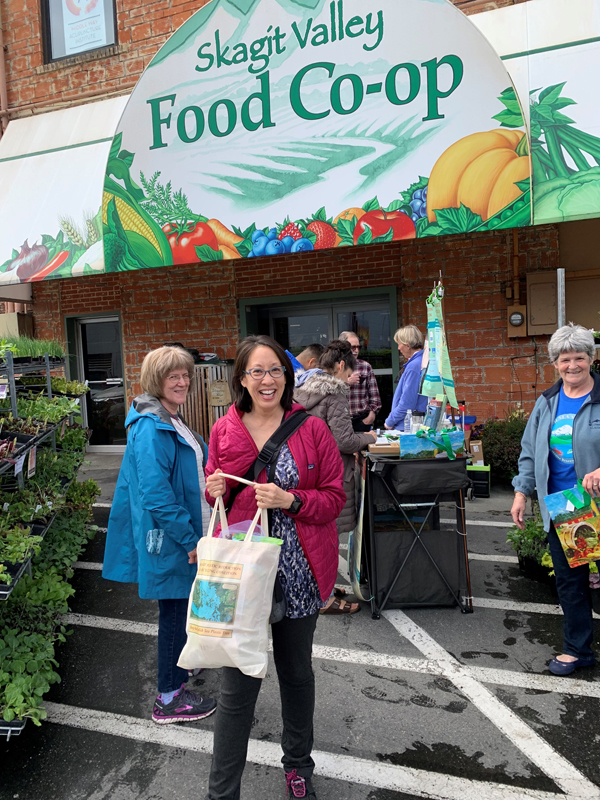
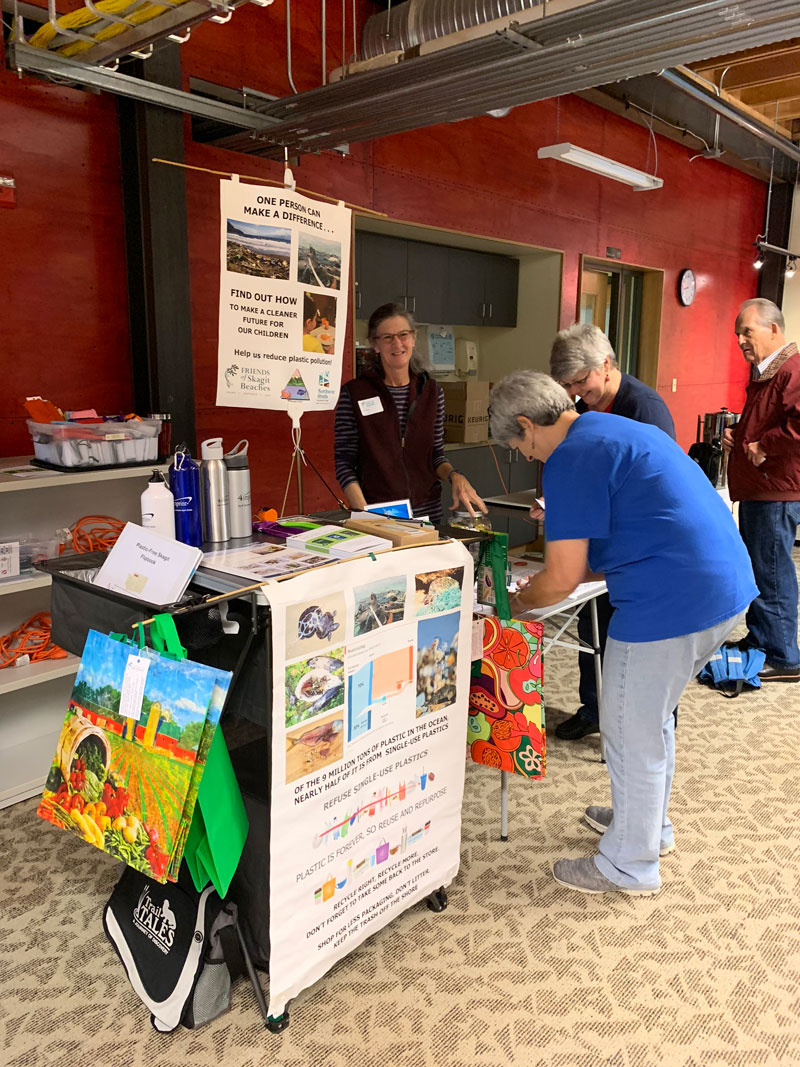
Check out our articles and resources:
- a guide to recycling, disposal, and dealing with leaked batteries.
The Dangers of Wishcycling - just because we think something looks recyclable doesn't mean it is!
The Problems with Plastics - learn more about microplastics and the impact on the environment!!
Refuse Single-Use Plastic in 2019! - learn more about how to reduce your "plastic footprint" and avoid throw-away living.
En Español: 2019 Primavera Boletin de la Coalicíon para Reducir el Uso de Plasticos y Reciclar en Skagit
Skagit Plastic Reduction & Recycling Coalition Brochures and other pamphlets:
Brochure:
Folleto En Español:
Skagit County Recycling Guidelines [Contado de Skagit Guia de reciclar]
Waste Management Guidelines for Skagit County:
1 page poster or full 4 page guide
Guia de Reciclaje en Español:
Do your part to prevent plastic waste from escaping into our environment and polluting our waterways and oceans.
Take the SPRRC plastic pledge to reduce single-use plastics. Download the form below and mail it in. We'll contact you about picking up your free reusable shopping and produce bags at our next outing in Skagit County.
Kids Pledge:
En Español:
Speakers and Bios
Fidalgo Shoreline Academy 2019
Session Details and Speaker Information
Keynote title: Love and Beauty in the time of turbulence
Presented by Jack Hart
Description: Our world and planet are changing; the challenges ahead are enormous. But we have within ourselves and among ourselves the resources to make a difference. Based on a riff from a new forest monitoring project in the ACFL, Jack will weave together the rhythms of hope and encouragement that keep us harmonizing in the coming turbulent times.
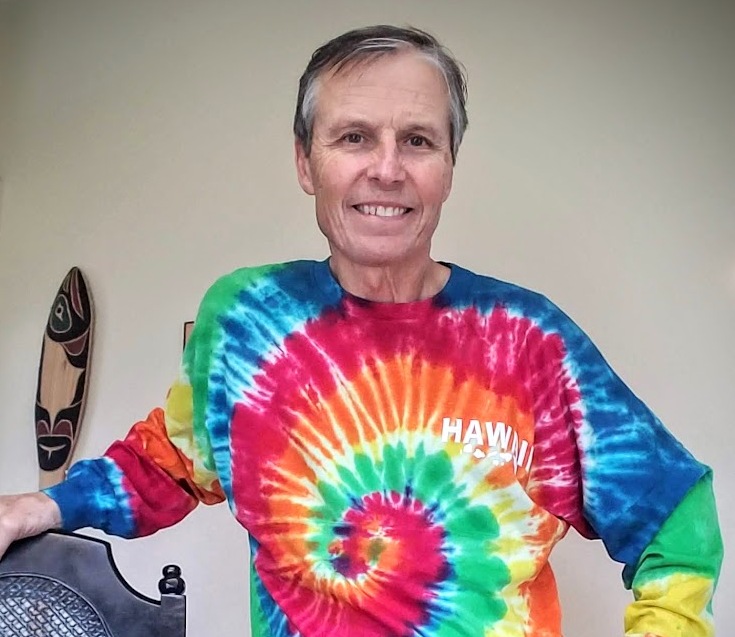 Jack Hartt was born and raised near the shores of the Salish Sea in Seattle. While in college he spent his summers as a fish researcher in Alaska, a volunteer at Mount Rainier, a restroom cleaner for the U. S. Forest Service, a backcountry ranger for Rocky Mountain National Park, and an interpreter at Dry Falls in Sun Lakes State Park. He graduated from college with a B. S. degree in Forest Science, specializing in park management. He spent the next forty years working in Washington State Parks. Deception Pass was Jack’s last state park to call home, living and serving there for fourteen years. He retired in 2017 and now makes his home in Skagit County. He loves beaches, sunsets and sunrises, warm weather, flying, photography, hiking, kayaking, writing, playing with his kids and grandkids, eating blackberry pie, and finding rainbows.
Jack Hartt was born and raised near the shores of the Salish Sea in Seattle. While in college he spent his summers as a fish researcher in Alaska, a volunteer at Mount Rainier, a restroom cleaner for the U. S. Forest Service, a backcountry ranger for Rocky Mountain National Park, and an interpreter at Dry Falls in Sun Lakes State Park. He graduated from college with a B. S. degree in Forest Science, specializing in park management. He spent the next forty years working in Washington State Parks. Deception Pass was Jack’s last state park to call home, living and serving there for fourteen years. He retired in 2017 and now makes his home in Skagit County. He loves beaches, sunsets and sunrises, warm weather, flying, photography, hiking, kayaking, writing, playing with his kids and grandkids, eating blackberry pie, and finding rainbows.
Session One Speakers and Presentations:
Shoreline Processes: Why we need coastal erosion
Andrea MacLennan, Senior coastal geomorphologist at Coastal Geologic Services
Presentation overview: Learn how the natural processes of coastal erosion and sediment transport of coastal banks and bluffs of the Salish Sea are vital to healthy nearshore ecosystems. These processes maintain habitats and food-web support for a large portion of marine life ranging from forage fish, and salmon, to orcas. As shoreline development continues, we must allow room for these processes to enable habitat and beaches to naturally adapt and respond to rising sea levels and other implications of climate change.
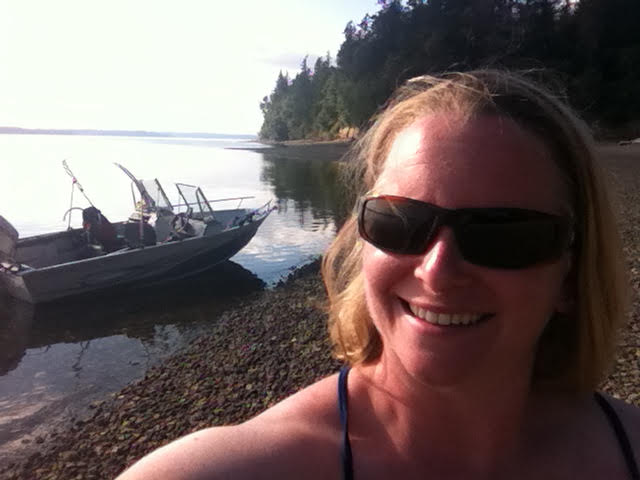 Speaker Biography: Andrea has an interdisciplinary background, having studied both coastal geomorphology and coastal ecology. She has been working for Coastal Geological Services since 2003 and in the Puget Sound area since 1999. Andrea specializes in nearshore geomorphic and habitat assessments, coastal bluff assessments, applied coastal management, restoration and conservation planning and prioritization, and sea level rise planning.
Speaker Biography: Andrea has an interdisciplinary background, having studied both coastal geomorphology and coastal ecology. She has been working for Coastal Geological Services since 2003 and in the Puget Sound area since 1999. Andrea specializes in nearshore geomorphic and habitat assessments, coastal bluff assessments, applied coastal management, restoration and conservation planning and prioritization, and sea level rise planning.
Climate Change and the Long-term Effects on Tree Health
Presenter: Dave Oicles, Certified Arborist and Park Ranger for the City of Anacortes
Presentation overview: Over the past 12 years, the Pacific NW has been experiencing a change in weather patterns, specifically warmer summers with drought conditions. These changes have been having a direct impact on the health of our forests, specially here on Fidalgo Island which is in a rain shadow. In the past 2 years, thousands and thousands of trees have died on Fidalgo Island. Learn what is happening and get the latest information on Pacific NW tree health issues.
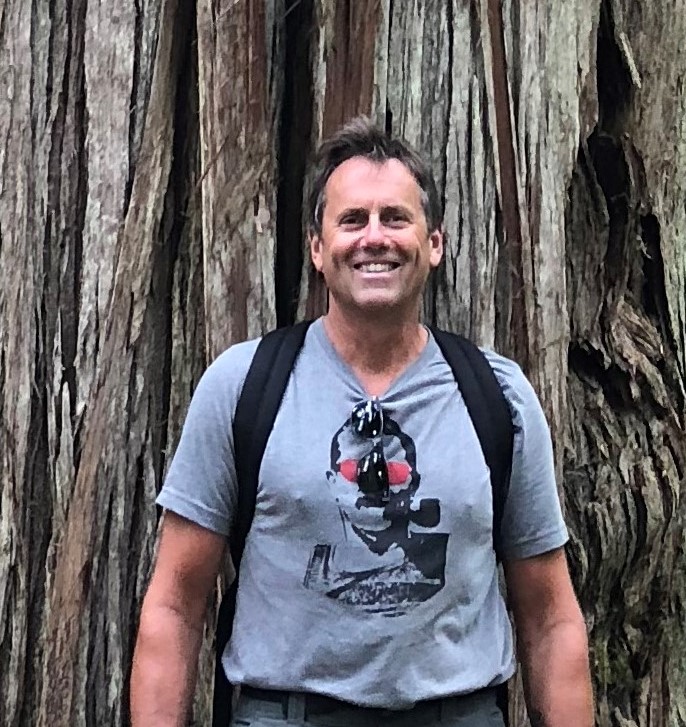 Speaker Biography: Dave has a B.S. degree in Natural Resources Management with a concentration in Parks and Outdoor Recreation, and also graduated from a Park Ranger Law Enforcement Academy. Dave is currently a Certified Arborist and Park Ranger for the City of Anacortes. His background includes working for the U.S. Forest Service, National Park Service, and the Bureau of Land Management. Dave also owns a travel agency in Anacortes and spends most of his spare time traveling the world.
Speaker Biography: Dave has a B.S. degree in Natural Resources Management with a concentration in Parks and Outdoor Recreation, and also graduated from a Park Ranger Law Enforcement Academy. Dave is currently a Certified Arborist and Park Ranger for the City of Anacortes. His background includes working for the U.S. Forest Service, National Park Service, and the Bureau of Land Management. Dave also owns a travel agency in Anacortes and spends most of his spare time traveling the world.
Session Two Speakers and Presentations:
Sharks of Washington State: The amazing predators in your backyard
Presenter: Dayv Lowry, PhD, Puget Sound Marine Fish Science Unit, WDFW
Presentation overview: Though most Washingtonians only think of dogfish when you say “shark,” and many don’t even make that connection, Washington is home to at least 12 species of shark that are regularly encountered in fisheries, by divers, and during scientific research. Though many misconceptions exist about sharks, this talk aims to dispel several myths using cold hard facts and share information about historic and current ecological, fishery, and cultural importance of sharks in Washington. With this broadened understanding, attendees should begin to see sharks for what they are: key evolutionary and ecological components of the living planet that we all call home.
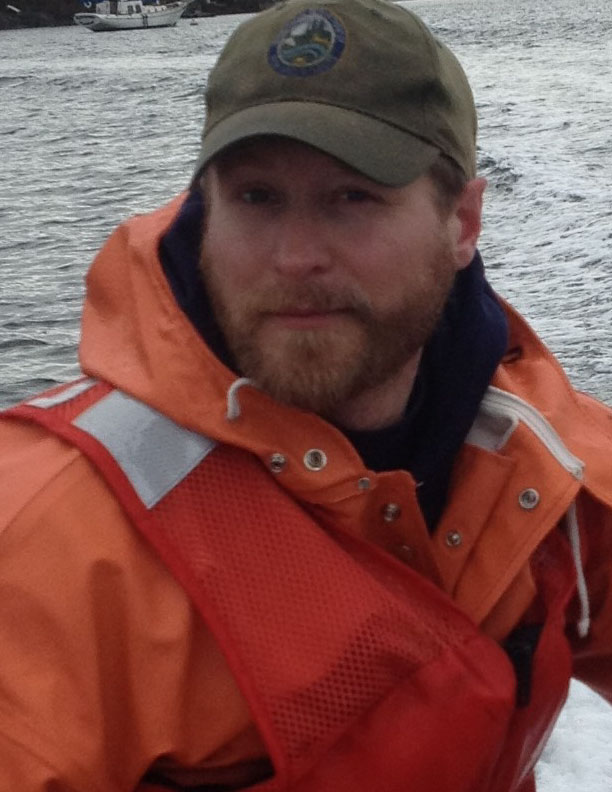 Biography: Dr. Dayv Lowry received his Ph.D. from the University of South Florida, currently leads the Puget Sound Marine Fish Science Unit at the Washington Department of Fish and Wildlife (WDFW), and has been engaged in shark research and conservation for over 20 years. He has published numerous peer-reviewed scientific manuscripts and government reports on the biology and ecology of marine fishes, and co-edited two books on sharks. He has organized and run international marine fish research symposia, developed and implemented fishery policies that promote sustainable conservation, and is currently a member of the International Union for Conservation of Nature (IUCN) Northeast Pacific Shark Specialist Group tasked with defining the conservation status of all shark species in the northeastern Pacific. He also serves as the WDFW representative on the North Pacific Fishery Management Council's Scientific and Statistical Committee, where he helps to manage fisheries in Alaskan waters. When not working, Dayv enjoys fishing, scuba diving, traveling with his family, and engaging in recreational sword fighting
Biography: Dr. Dayv Lowry received his Ph.D. from the University of South Florida, currently leads the Puget Sound Marine Fish Science Unit at the Washington Department of Fish and Wildlife (WDFW), and has been engaged in shark research and conservation for over 20 years. He has published numerous peer-reviewed scientific manuscripts and government reports on the biology and ecology of marine fishes, and co-edited two books on sharks. He has organized and run international marine fish research symposia, developed and implemented fishery policies that promote sustainable conservation, and is currently a member of the International Union for Conservation of Nature (IUCN) Northeast Pacific Shark Specialist Group tasked with defining the conservation status of all shark species in the northeastern Pacific. He also serves as the WDFW representative on the North Pacific Fishery Management Council's Scientific and Statistical Committee, where he helps to manage fisheries in Alaskan waters. When not working, Dayv enjoys fishing, scuba diving, traveling with his family, and engaging in recreational sword fighting
Wetlands: What are they and why should you care?
Vikki Jackson, Wetland Ecologist, Whatcom Amphibian Monitoring Program
Presentation overview: Wetlands have been the focus of a lot of attention over the past 25 years. What is all the hype about? Vikki will introduce what a wetland is, how they work, where to find them and most importantly how they affect you!
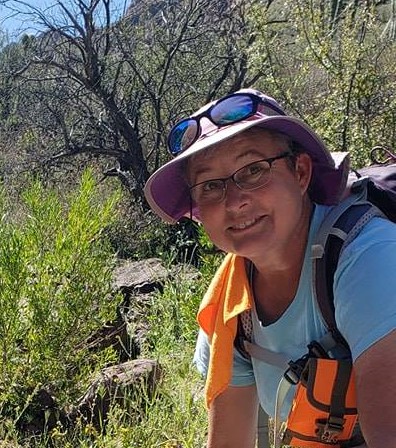 Biography: Vikki recently retired from a 27-year career as a consulting wetland Ecologist. She was the founding partner of Northwest Ecological Services, a environmental consulting firm in Bellingham, WA. She has extensive experience in wetland delineation, permitting, mitigation design and implementation and wildlife assessments. She continues to manage a local nonprofit (Whatcom County Amphibian Monitoring Program) focused on the research and conservation of amphibians. She now enjoys winters botanizing and wildlife watching in Arizona during the winters and chasing frogs all summer in Washington.
Biography: Vikki recently retired from a 27-year career as a consulting wetland Ecologist. She was the founding partner of Northwest Ecological Services, a environmental consulting firm in Bellingham, WA. She has extensive experience in wetland delineation, permitting, mitigation design and implementation and wildlife assessments. She continues to manage a local nonprofit (Whatcom County Amphibian Monitoring Program) focused on the research and conservation of amphibians. She now enjoys winters botanizing and wildlife watching in Arizona during the winters and chasing frogs all summer in Washington.
Session Three Speakers and Presentations:
Tying Indigenous Science to Modern Day Research and Restoration
Todd Woodard, Director of the Samish Indian Nation’s Natural Resources Department
Presentation overview: Incorporating the vast amount of Indigenous Scientific Knowledge can guide modern day restoration and research efforts. Using examples from the Samish Indian Nation’s Department of Natural Resources, Todd will show how incorporating Indigenous Science can tell a more complete story and guide modern day environmental work.
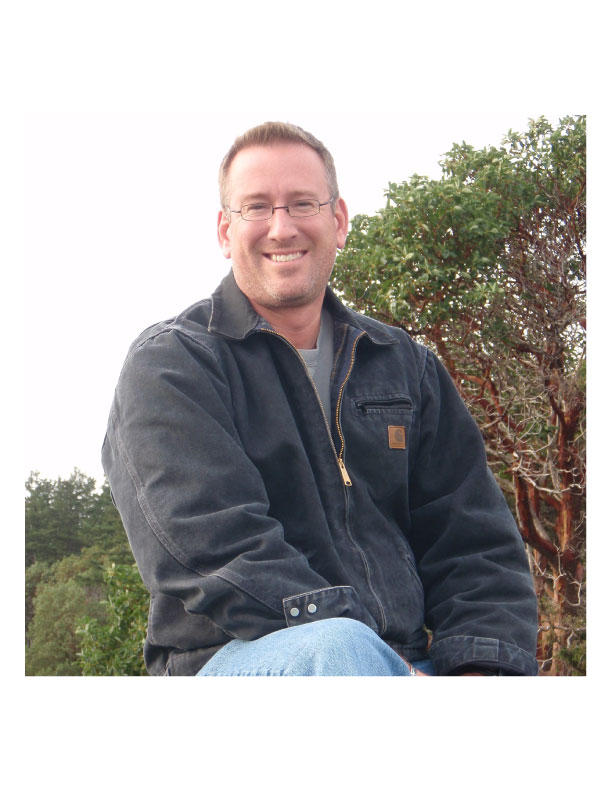 Biography: Todd Woodard holds an AA in Environmental Conservation Technology and a BA degree in Anthropology with a minor in Biology. Todd has over 16 years’ experience in field sample collection and environmental monitoring and data analysis, management and grant administration mostly with Tribes in Western Washington. In addition, Todd has been involved in numerous stream and beach restoration projects involving riparian planting and large woody debris placement as well as grants management and reporting activities. As the Director of Natural resources for the Samish Indian Nation, Todd and his staff are tasked with “Preserving, Protecting and Enhancing Culturally Significant Natural Resources and Habitats within Samish Traditional Territory for Current and Future Generations”. In his spare time, Todd is an avid sea kayaker exploring the waters of the Salish Sea and beyond.
Biography: Todd Woodard holds an AA in Environmental Conservation Technology and a BA degree in Anthropology with a minor in Biology. Todd has over 16 years’ experience in field sample collection and environmental monitoring and data analysis, management and grant administration mostly with Tribes in Western Washington. In addition, Todd has been involved in numerous stream and beach restoration projects involving riparian planting and large woody debris placement as well as grants management and reporting activities. As the Director of Natural resources for the Samish Indian Nation, Todd and his staff are tasked with “Preserving, Protecting and Enhancing Culturally Significant Natural Resources and Habitats within Samish Traditional Territory for Current and Future Generations”. In his spare time, Todd is an avid sea kayaker exploring the waters of the Salish Sea and beyond.
Otters and Eagles, People and Pets
Shona Aitken, Education Coordinator at Wolf Hollow Wildlife Rehabilitation Center
Presentation overview: As the human population of our local area increases, how are our activities impacting the wild creatures that live here? Discover the main reasons why injured and orphaned wild animals need care at the rehab center, and discuss what we can do to reduce human impacts on these animals and their habitats.
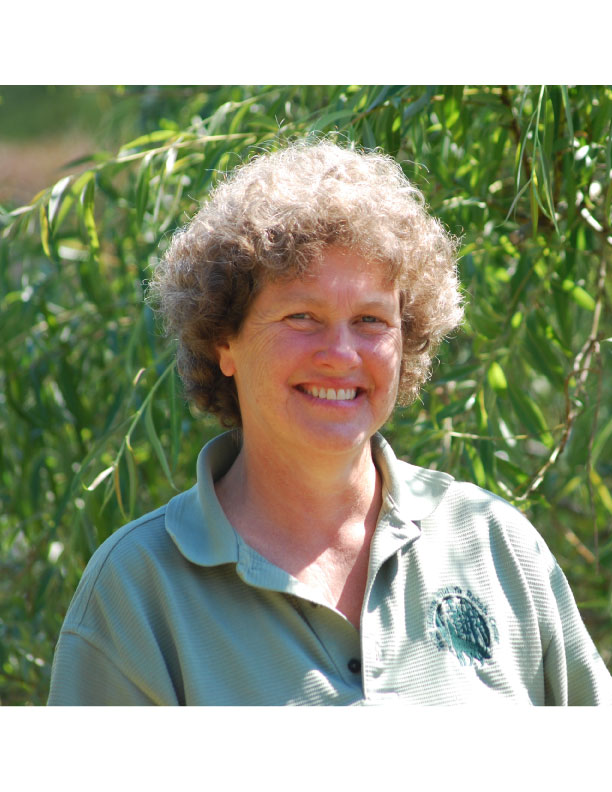 Biography: Shona is Education Coordinator at Wolf Hollow Wildlife Rehabilitation Center, and has worked in education and animal care positions at the center for over 29 years. Born and raised in Scotland, she has a degree in Ecology from Stirling University. She has experience working for the Royal Society for the Protection of Birds (RSPB), as a Countryside Ranger in several parks in Scotland, and carrying out field research in Sweden, before coming to the US in 1990. Shona and her husband live on San Juan Island, where they enjoy hiking, gardening, watching wildlife and experiencing everything from spring wild flowers to winter storms.
Biography: Shona is Education Coordinator at Wolf Hollow Wildlife Rehabilitation Center, and has worked in education and animal care positions at the center for over 29 years. Born and raised in Scotland, she has a degree in Ecology from Stirling University. She has experience working for the Royal Society for the Protection of Birds (RSPB), as a Countryside Ranger in several parks in Scotland, and carrying out field research in Sweden, before coming to the US in 1990. Shona and her husband live on San Juan Island, where they enjoy hiking, gardening, watching wildlife and experiencing everything from spring wild flowers to winter storms.
(Back to FSA main page)
Fidalgo Bay Day
Celebrate the Fidalgo Bay Estuary - with a Scavenger Hunt
Fidalgo Bay Day & National Estuaries Day
2020 brings new family activities as Fidalgo Bay Day becomes a month long scavenger hunt for our local friends and families! Friends of Skagit Beaches has teamed up with other community partners to help host the Skagit Marine Resources Committee's (SMRC) Fidalgo Bay Day and celebrate one of Skagit County's most important resources - the estuaries and aquatic reserve.
Families have a wonderful time and we invite kids (of all ages) to pick up your Trail Tales "Discovery Passport" and explore the trail stations sponsored by a variety of organizations. Talk to our docents, get your passport stamped, and there's a prize after it is all filled in!
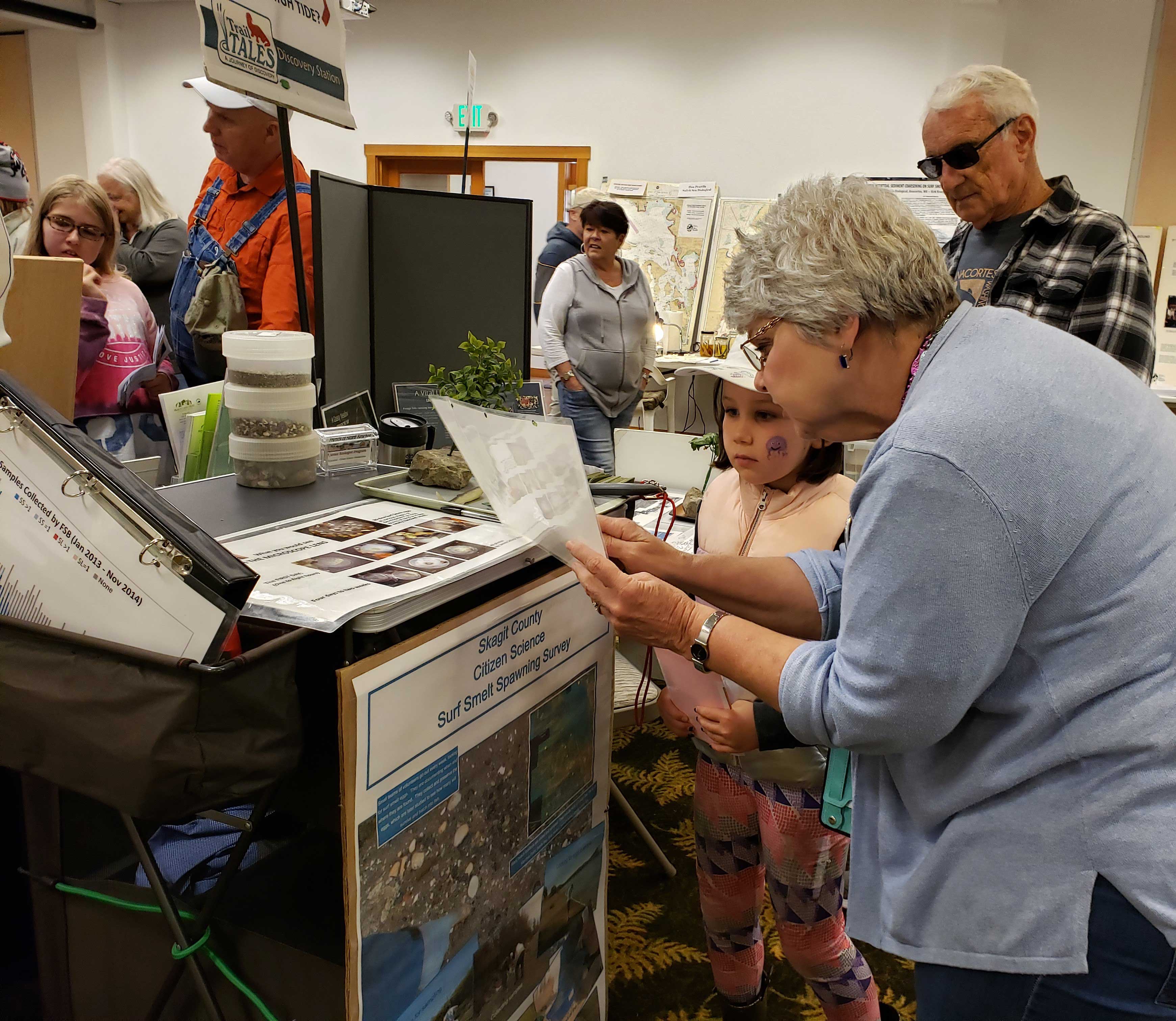
If you would like to volunteer for this event please contact us This email address is being protected from spambots. You need JavaScript enabled to view it.
But you may be wondering . . .
What is an estuary?
An estuary is a partially enclosed body of water formed by fresh water from rivers flowing into and mixing with ocean saltwater. Often, the fresh water is prevented from flowing into the open ocean by land masses such as peninsulas, islands, or surrounding salt marshes. This makes estuaries unique environments that sustain a diverse biological community of plants and animals. Some of the most commonly known estuaries in the United States are the Chesapeake Bay, Puget Sound, and the Indian River Lagoon. [Restore America's Estuaries]
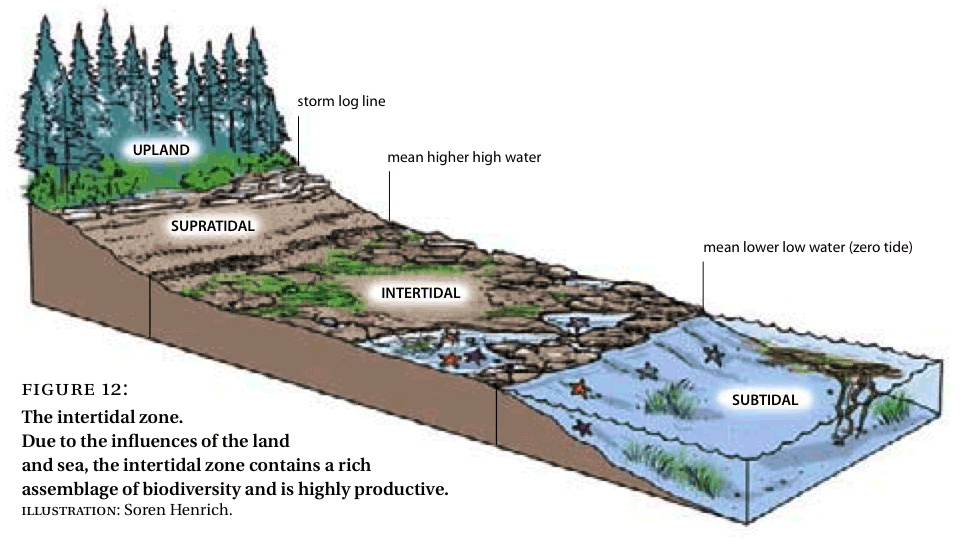
(Diagram from Taking Nature's Pulse: Section 2: B.C.'s Natural Legacy)
Trail Tales - A Journey of Discovery
Trail Tales leads us on a journey to discover the natural beauty, diverse ecology, and history of our local shorelines and bays, while calling us to restore and protect it for future generations.
Check out the September 2016 Fidalgo Living article about Trail Tales.
Trail Tales offers a wide variety of learning and recreation opportunities primarily in Anacortes and at the Padilla Bay Interpretive Center. Visit our Trail Tales website to learn more about our community, natural resources, and environmental cleanup programs.
Trail Tales is a community-focused educational outreach and shoreline interpretive program centered in Skagit County Washington. Sponsorship and most of the funding for this project is provided by the Washington State Department of Ecology’s (Ecology) Public Participation Grant (PPG) Program. This program funds non-profit organizations with the objective of increasing public understanding 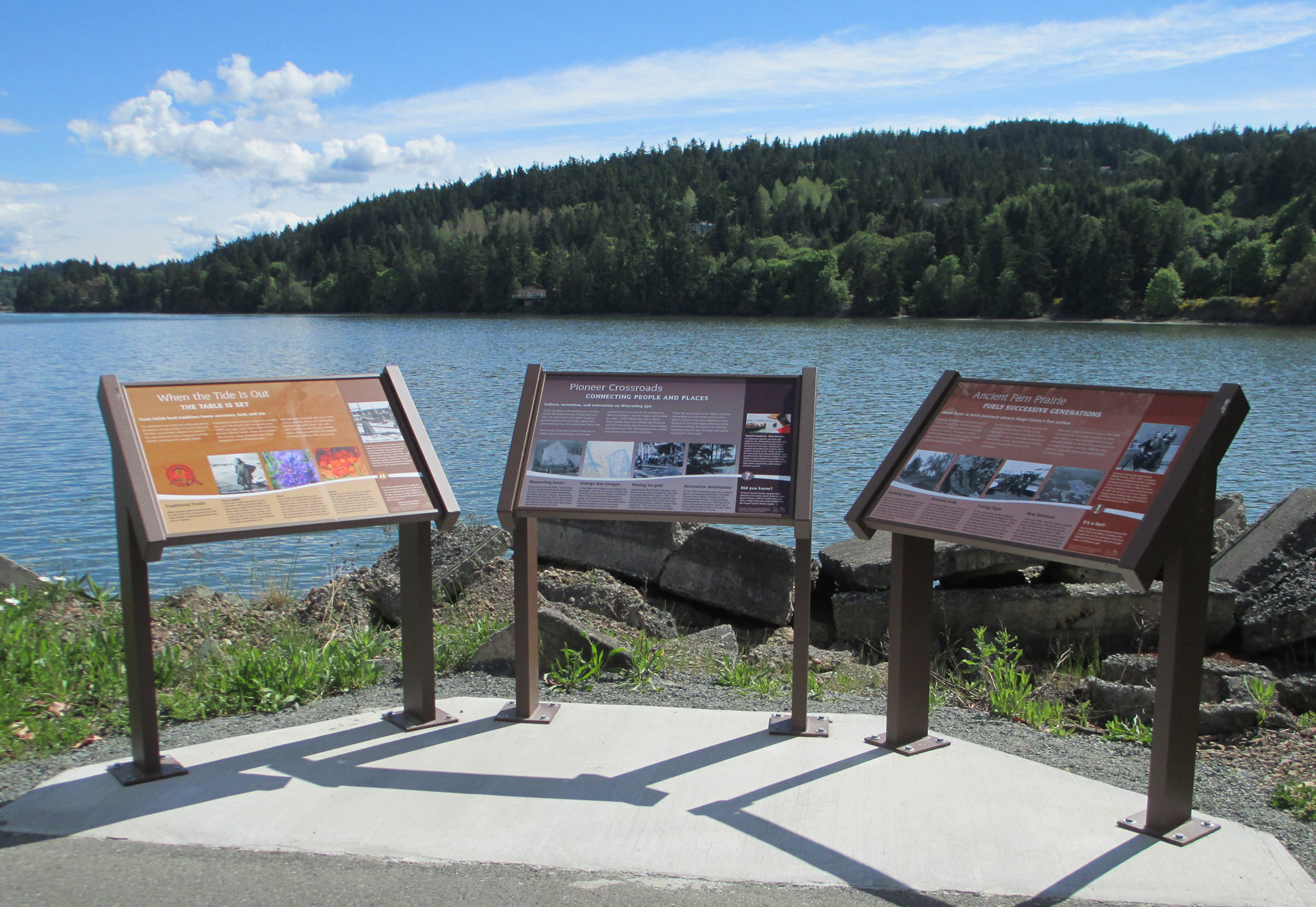 and participation in the investigation and remediation work that Ecology is doing at contaminated sites. The program is also charged to support the Puget Sound Initiative goal to increase general literacy about the health of Puget Sound and engage the public in its protection.
and participation in the investigation and remediation work that Ecology is doing at contaminated sites. The program is also charged to support the Puget Sound Initiative goal to increase general literacy about the health of Puget Sound and engage the public in its protection.
Our interpretive programs and resources include:
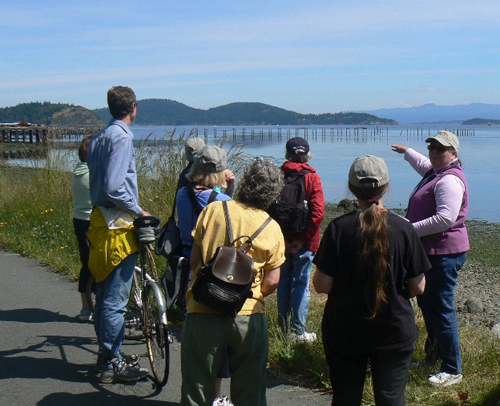
Docent-led Interpretive Walks and Bike Rides (discontinued - available on request to This email address is being protected from spambots. You need JavaScript enabled to view it..)
Interpretive signs with a brochure and map for self-guided walks
Short Films on Friends Vimeo Channel
"Films with Friends" fall film series
A website full of information and stories
Our key partners in this endeavor are:
Washington Department of Ecology Toxics Cleanup Program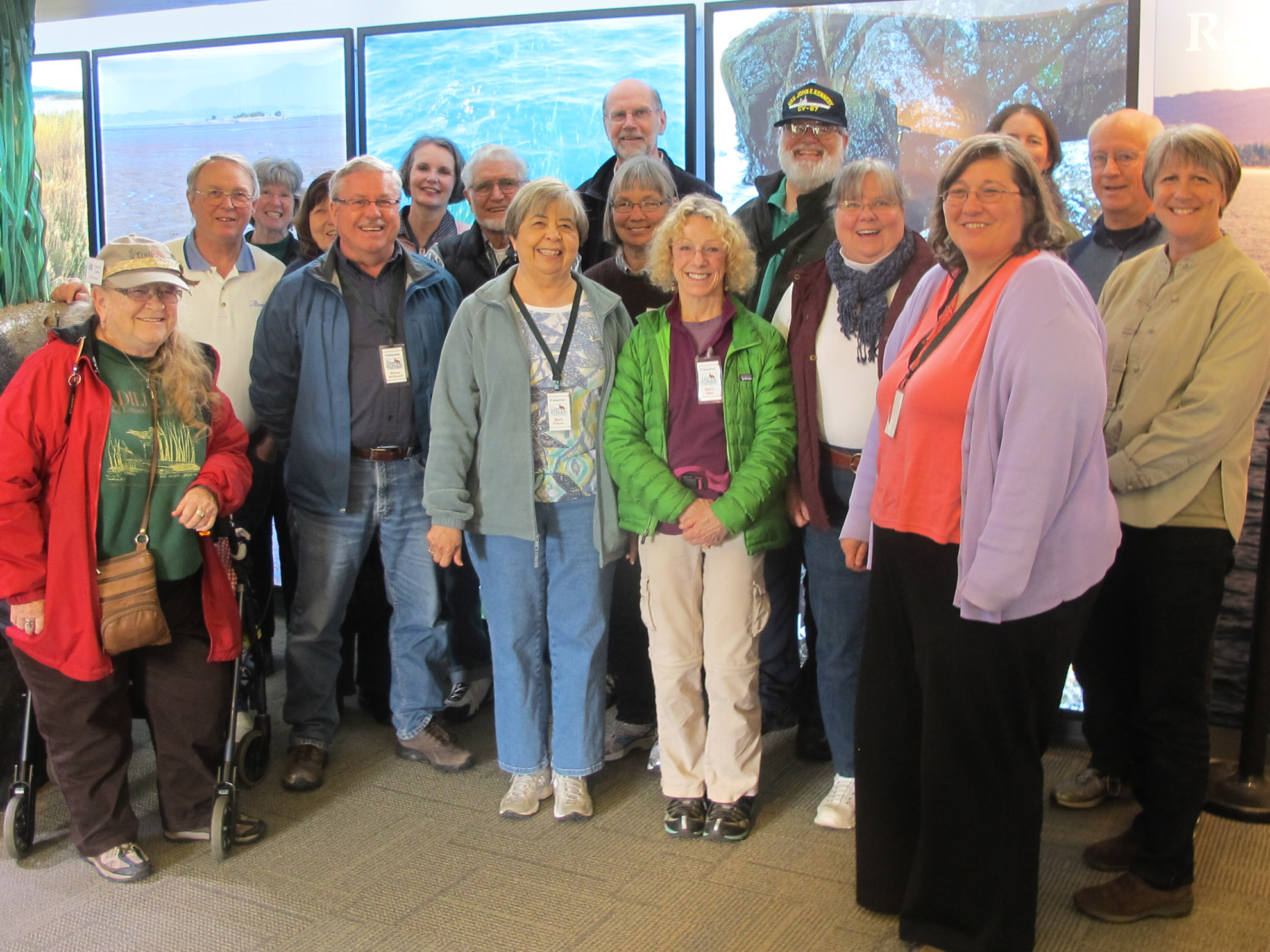
City of Anacortes Parks & Recreation Department & Museum
Port of Anacortes
Samish Indian Nation
Coastal Volunteer Partnership at Padilla Bay
. . . and of course our amazing volunteers!
Trail Tales offers educational and recreational activities in a setting that offers rich history and dramatic natural beauty along the shores or Fidalgo and Padilla Bays. The project strives to increase public understanding of the importance of the valuable natural resources these bays and shorelines provide, and foster a sense of public stewardship through programs that connect participants to the history, culture, economic and recreational value, and marine ecology of the beautiful shorelines and bays situated in Skagit County.
Skagit County is a unique place that is home to three protected reserves including the Padilla Bay National Estuarine Research Reserve and the Fidalgo Bay and Cypress Island Aquatic reserves managed by the WA State Department of Natural Resources.
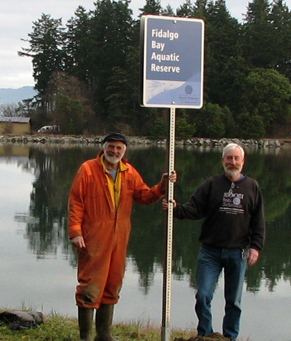
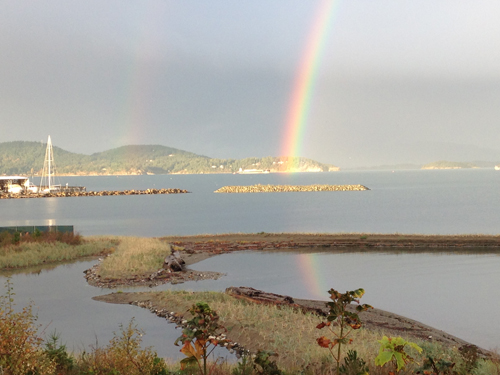
Film Series
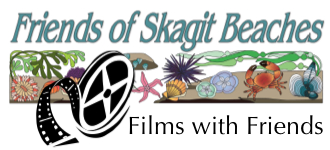
The Films with Friends film series was sponsored by the Friends Trail Tales project. The film series offered four contemporary, feature-length environmental documentaries on topics of current interest. Each showing was preceded by the premiere of a short, student-made documentary most funded by Trail Tales on a locally relevant topic. There is currently no plans to have a film series in 2018 but we will certainly let our members know when we are hosting a new series!
You can view these student shorts at the Friends Vimeo channel.
Past Years
2015 Featured Young Filmmaker
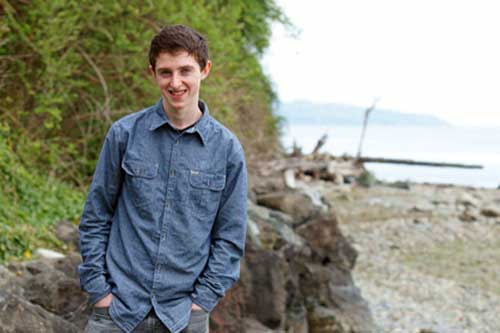
Jesse Nichols, Western Washington University
2014 Featured Young Filmmakers
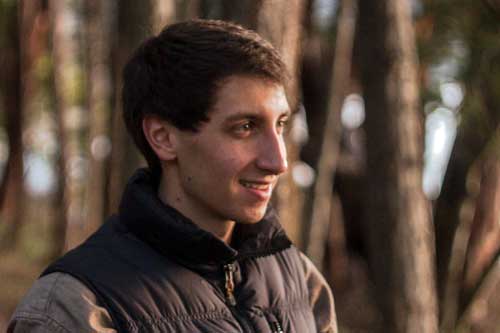
Ryan Hasert – Western Washington University (WWU)
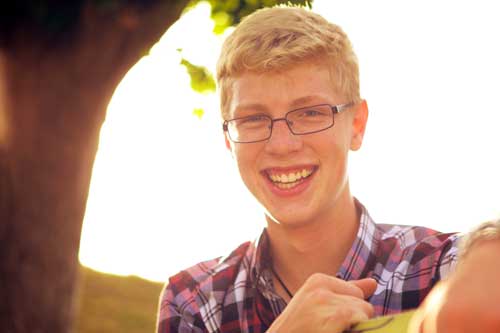
Lucas Holgeerts (WWU) and Henry Holgeerts (Anacortes High School).
Prior Year Film Series Posters
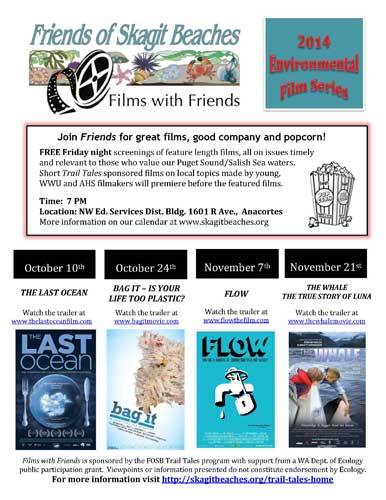
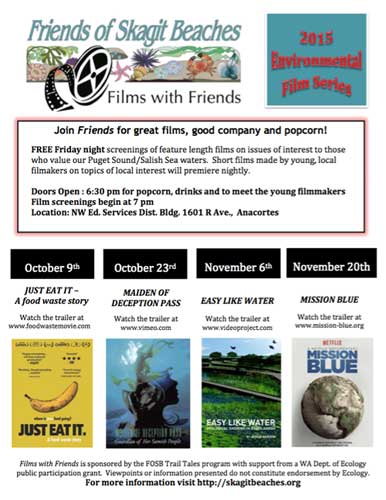
Fidalgo Shoreline Academy
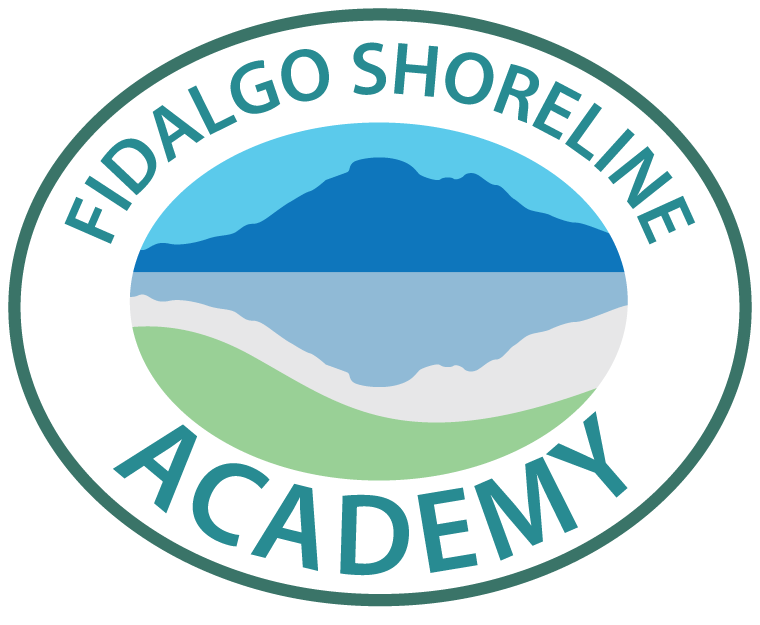
Dear FSA friends and participants,
As much as we would love to once again gather and learn together, current state and government COVID-19 guidelines make it unfeasible for us to host this conference in 2020. We look forward to a healthy future and opportunities in 2021 for Friends to bring FSA back to our community.
Fidalgo Shoreline Academy, sponsored by Friends of Skagit Beaches, is designed to encourage you to care for and protect our local marine and shoreline environments. Your day will include an inspiring keynote address and three interesting breakout sessions of your choice.
"Interesting, inspiring, useful!" "I loved learning about my local community"
"The speakers were great - they really knew there subjects..."
"Coming together with like-minded people, learning and sharing - it was fantastic..."
Teachers - you can recieve up to 5 clock hours for attending this event!
For more information contact us at This email address is being protected from spambots. You need JavaScript enabled to view it.
Winter Lecture Series
2021 16th Annual Winter Lecture Series
The 2021 Lecture Series is a Wrap!
Thank you to our wonderful presenters who helped support our work in these interesting times! If you missed one of our online lectures this year, click on the title below and you can watch it at your convenience.
Bonus Lecture:
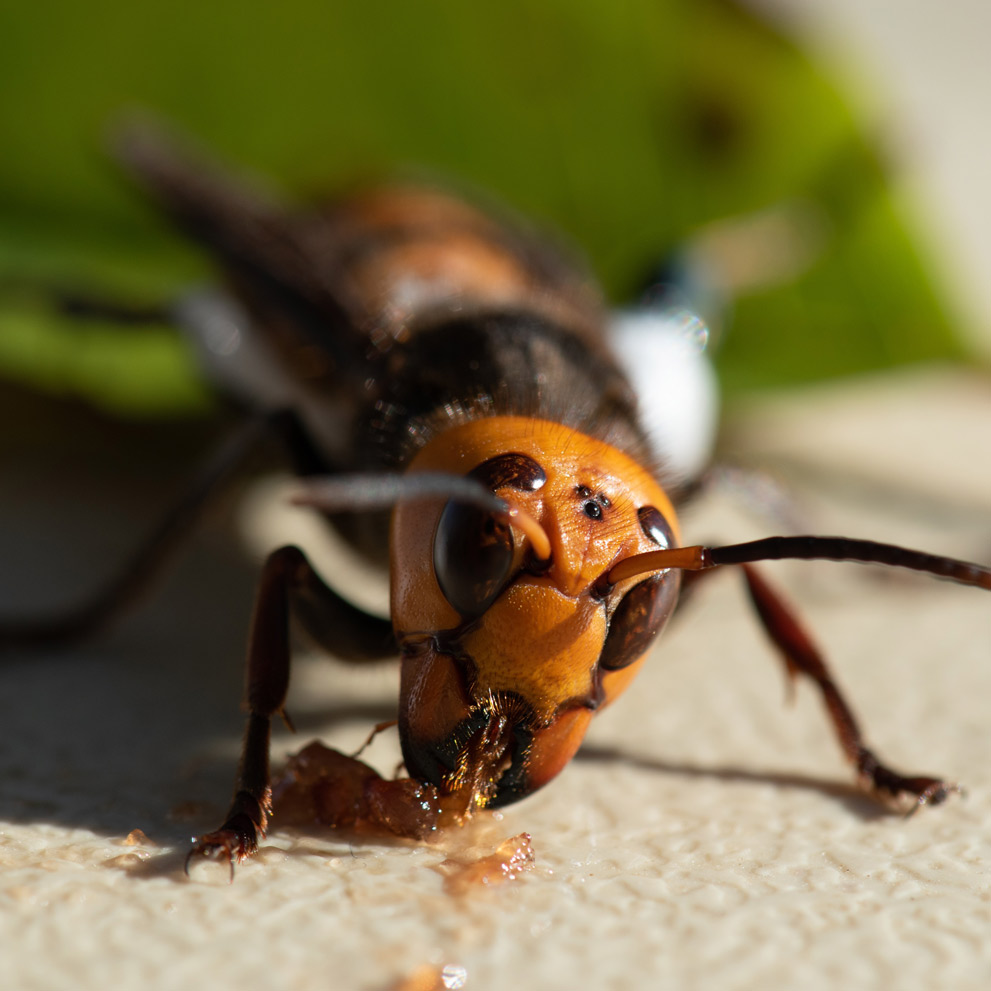
Giant Asian Hornets ~ Cassie Cichorz - with WSDA; Asian giant hornet outreach and education specialist - talks about the Asian giant hornet and how they pose a serious threat to honey bee populations
See you online!
Thanks to all our presenters, organizers and participants. If you enjoy the lectures, please donate to help support Friends and our programming! Donate here!

 If a stormwater outfall exceeds any of the State limits the volunteer notifies the City of Anacortes Stormwater Manager, Diane Hennebert. She will engage the City's Public Works department in finding the source of the pollution.
If a stormwater outfall exceeds any of the State limits the volunteer notifies the City of Anacortes Stormwater Manager, Diane Hennebert. She will engage the City's Public Works department in finding the source of the pollution. Diane Hennebert: Stormwater Manager for City of Anacortes. Diane provides the scientific background related to water quality. She basically tells us the meaning behind the measurements we take.
Diane Hennebert: Stormwater Manager for City of Anacortes. Diane provides the scientific background related to water quality. She basically tells us the meaning behind the measurements we take. During half the year, the cold and rainy half, most of the water samples will be gathered at night. Many of the City's stormwater outfalls are fully exposed at only around low tide. During the winter this is usually at night and there is a 50/50 chance it will be raining and cold.
During half the year, the cold and rainy half, most of the water samples will be gathered at night. Many of the City's stormwater outfalls are fully exposed at only around low tide. During the winter this is usually at night and there is a 50/50 chance it will be raining and cold.
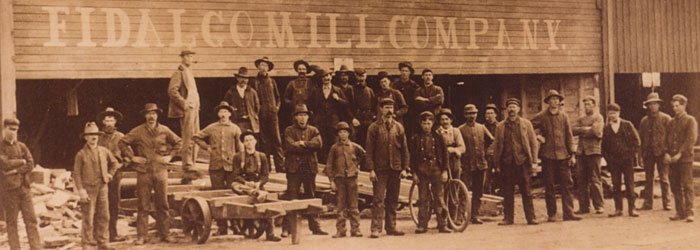

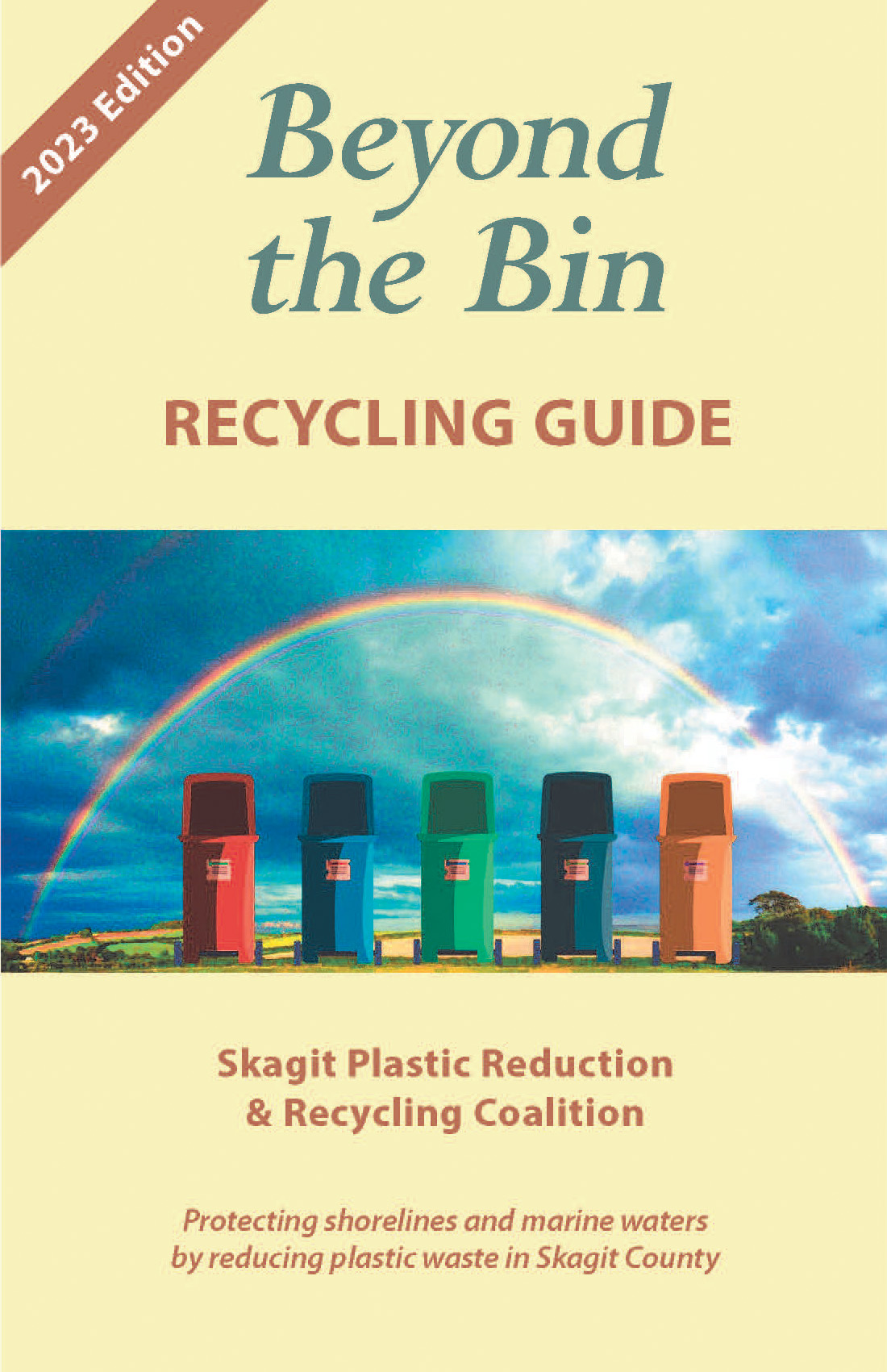
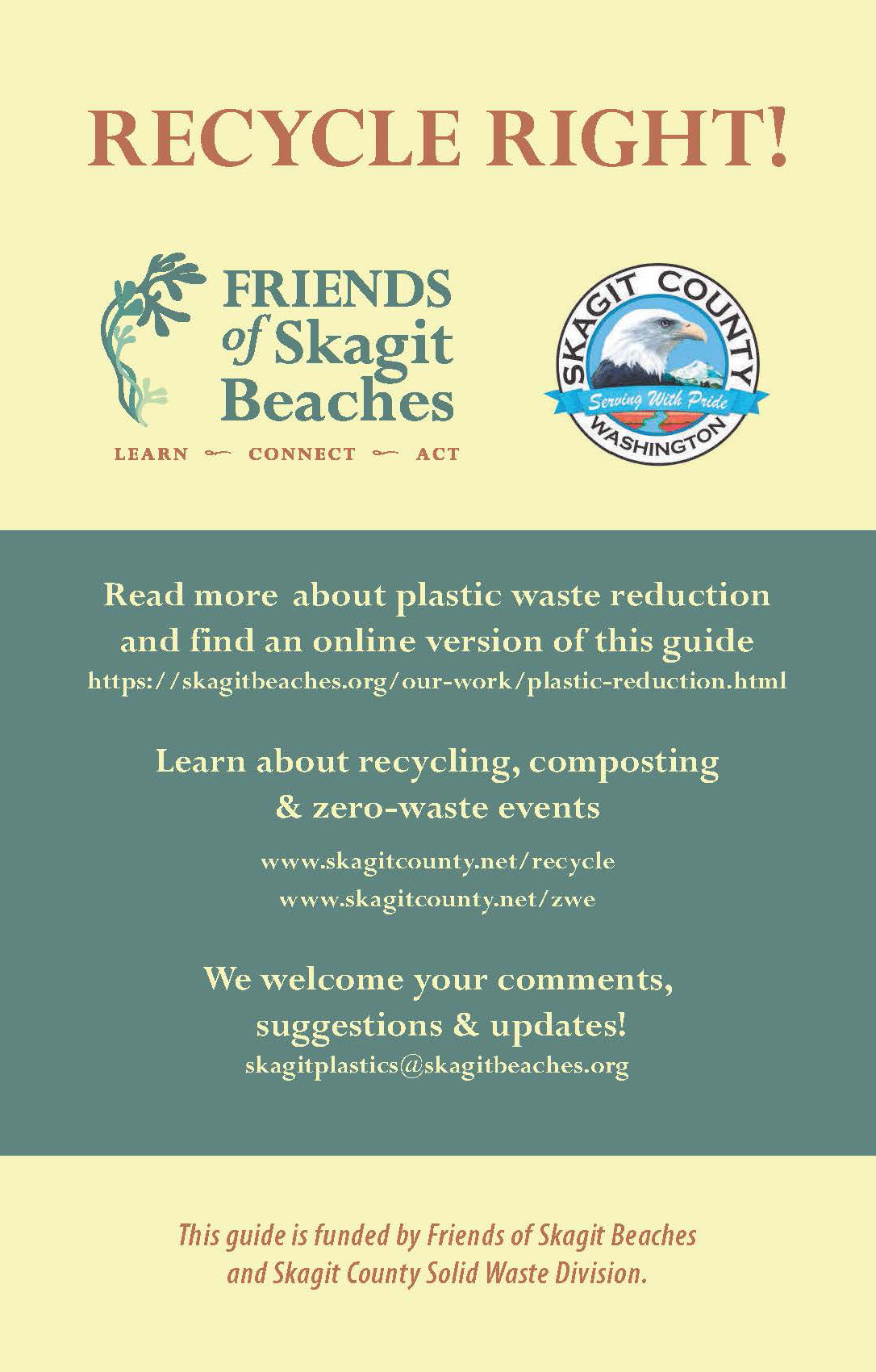


 Jack Hartt was born and raised near the shores of the Salish Sea in Seattle. While in college he spent his summers as a fish researcher in Alaska, a volunteer at Mount Rainier, a restroom cleaner for the U. S. Forest Service, a backcountry ranger for Rocky Mountain National Park, and an interpreter at Dry Falls in Sun Lakes State Park. He graduated from college with a B. S. degree in Forest Science, specializing in park management. He spent the next forty years working in Washington State Parks. Deception Pass was Jack’s last state park to call home, living and serving there for fourteen years. He retired in 2017 and now makes his home in Skagit County. He loves beaches, sunsets and sunrises, warm weather, flying, photography, hiking, kayaking, writing, playing with his kids and grandkids, eating blackberry pie, and finding rainbows.
Jack Hartt was born and raised near the shores of the Salish Sea in Seattle. While in college he spent his summers as a fish researcher in Alaska, a volunteer at Mount Rainier, a restroom cleaner for the U. S. Forest Service, a backcountry ranger for Rocky Mountain National Park, and an interpreter at Dry Falls in Sun Lakes State Park. He graduated from college with a B. S. degree in Forest Science, specializing in park management. He spent the next forty years working in Washington State Parks. Deception Pass was Jack’s last state park to call home, living and serving there for fourteen years. He retired in 2017 and now makes his home in Skagit County. He loves beaches, sunsets and sunrises, warm weather, flying, photography, hiking, kayaking, writing, playing with his kids and grandkids, eating blackberry pie, and finding rainbows. Speaker Biography: Andrea has an interdisciplinary background, having studied both coastal geomorphology and coastal ecology. She has been working for Coastal Geological Services since 2003 and in the Puget Sound area since 1999. Andrea specializes in nearshore geomorphic and habitat assessments, coastal bluff assessments, applied coastal management, restoration and conservation planning and prioritization, and sea level rise planning.
Speaker Biography: Andrea has an interdisciplinary background, having studied both coastal geomorphology and coastal ecology. She has been working for Coastal Geological Services since 2003 and in the Puget Sound area since 1999. Andrea specializes in nearshore geomorphic and habitat assessments, coastal bluff assessments, applied coastal management, restoration and conservation planning and prioritization, and sea level rise planning. Speaker Biography: Dave has a B.S. degree in Natural Resources Management with a concentration in Parks and Outdoor Recreation, and also graduated from a Park Ranger Law Enforcement Academy. Dave is currently a Certified Arborist and Park Ranger for the City of Anacortes. His background includes working for the U.S. Forest Service, National Park Service, and the Bureau of Land Management. Dave also owns a travel agency in Anacortes and spends most of his spare time traveling the world.
Speaker Biography: Dave has a B.S. degree in Natural Resources Management with a concentration in Parks and Outdoor Recreation, and also graduated from a Park Ranger Law Enforcement Academy. Dave is currently a Certified Arborist and Park Ranger for the City of Anacortes. His background includes working for the U.S. Forest Service, National Park Service, and the Bureau of Land Management. Dave also owns a travel agency in Anacortes and spends most of his spare time traveling the world. Biography: Dr. Dayv Lowry received his Ph.D. from the University of South Florida, currently leads the Puget Sound Marine Fish Science Unit at the Washington Department of Fish and Wildlife (WDFW), and has been engaged in shark research and conservation for over 20 years. He has published numerous peer-reviewed scientific manuscripts and government reports on the biology and ecology of marine fishes, and co-edited two books on sharks. He has organized and run international marine fish research symposia, developed and implemented fishery policies that promote sustainable conservation, and is currently a member of the International Union for Conservation of Nature (IUCN) Northeast Pacific Shark Specialist Group tasked with defining the conservation status of all shark species in the northeastern Pacific. He also serves as the WDFW representative on the North Pacific Fishery Management Council's Scientific and Statistical Committee, where he helps to manage fisheries in Alaskan waters. When not working, Dayv enjoys fishing, scuba diving, traveling with his family, and engaging in recreational sword fighting
Biography: Dr. Dayv Lowry received his Ph.D. from the University of South Florida, currently leads the Puget Sound Marine Fish Science Unit at the Washington Department of Fish and Wildlife (WDFW), and has been engaged in shark research and conservation for over 20 years. He has published numerous peer-reviewed scientific manuscripts and government reports on the biology and ecology of marine fishes, and co-edited two books on sharks. He has organized and run international marine fish research symposia, developed and implemented fishery policies that promote sustainable conservation, and is currently a member of the International Union for Conservation of Nature (IUCN) Northeast Pacific Shark Specialist Group tasked with defining the conservation status of all shark species in the northeastern Pacific. He also serves as the WDFW representative on the North Pacific Fishery Management Council's Scientific and Statistical Committee, where he helps to manage fisheries in Alaskan waters. When not working, Dayv enjoys fishing, scuba diving, traveling with his family, and engaging in recreational sword fighting Biography: Vikki recently retired from a 27-year career as a consulting wetland Ecologist. She was the founding partner of Northwest Ecological Services, a environmental consulting firm in Bellingham, WA. She has extensive experience in wetland delineation, permitting, mitigation design and implementation and wildlife assessments. She continues to manage a local nonprofit (Whatcom County Amphibian Monitoring Program) focused on the research and conservation of amphibians. She now enjoys winters botanizing and wildlife watching in Arizona during the winters and chasing frogs all summer in Washington.
Biography: Vikki recently retired from a 27-year career as a consulting wetland Ecologist. She was the founding partner of Northwest Ecological Services, a environmental consulting firm in Bellingham, WA. She has extensive experience in wetland delineation, permitting, mitigation design and implementation and wildlife assessments. She continues to manage a local nonprofit (Whatcom County Amphibian Monitoring Program) focused on the research and conservation of amphibians. She now enjoys winters botanizing and wildlife watching in Arizona during the winters and chasing frogs all summer in Washington. Biography: Todd Woodard holds an AA in Environmental Conservation Technology and a BA degree in Anthropology with a minor in Biology. Todd has over 16 years’ experience in field sample collection and environmental monitoring and data analysis, management and grant administration mostly with Tribes in Western Washington. In addition, Todd has been involved in numerous stream and beach restoration projects involving riparian planting and large woody debris placement as well as grants management and reporting activities. As the Director of Natural resources for the Samish Indian Nation, Todd and his staff are tasked with “Preserving, Protecting and Enhancing Culturally Significant Natural Resources and Habitats within Samish Traditional Territory for Current and Future Generations”. In his spare time, Todd is an avid sea kayaker exploring the waters of the Salish Sea and beyond.
Biography: Todd Woodard holds an AA in Environmental Conservation Technology and a BA degree in Anthropology with a minor in Biology. Todd has over 16 years’ experience in field sample collection and environmental monitoring and data analysis, management and grant administration mostly with Tribes in Western Washington. In addition, Todd has been involved in numerous stream and beach restoration projects involving riparian planting and large woody debris placement as well as grants management and reporting activities. As the Director of Natural resources for the Samish Indian Nation, Todd and his staff are tasked with “Preserving, Protecting and Enhancing Culturally Significant Natural Resources and Habitats within Samish Traditional Territory for Current and Future Generations”. In his spare time, Todd is an avid sea kayaker exploring the waters of the Salish Sea and beyond. Biography: Shona is Education Coordinator at Wolf Hollow Wildlife Rehabilitation Center, and has worked in education and animal care positions at the center for over 29 years. Born and raised in Scotland, she has a degree in Ecology from Stirling University. She has experience working for the Royal Society for the Protection of Birds (RSPB), as a Countryside Ranger in several parks in Scotland, and carrying out field research in Sweden, before coming to the US in 1990. Shona and her husband live on San Juan Island, where they enjoy hiking, gardening, watching wildlife and experiencing everything from spring wild flowers to winter storms.
Biography: Shona is Education Coordinator at Wolf Hollow Wildlife Rehabilitation Center, and has worked in education and animal care positions at the center for over 29 years. Born and raised in Scotland, she has a degree in Ecology from Stirling University. She has experience working for the Royal Society for the Protection of Birds (RSPB), as a Countryside Ranger in several parks in Scotland, and carrying out field research in Sweden, before coming to the US in 1990. Shona and her husband live on San Juan Island, where they enjoy hiking, gardening, watching wildlife and experiencing everything from spring wild flowers to winter storms.

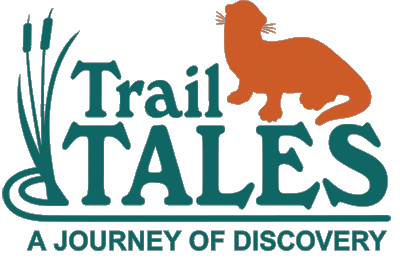
 and participation in the investigation and remediation work that Ecology is doing at contaminated sites. The program is also charged to support the Puget Sound Initiative goal to increase general literacy about the health of Puget Sound and engage the public in its protection.
and participation in the investigation and remediation work that Ecology is doing at contaminated sites. The program is also charged to support the Puget Sound Initiative goal to increase general literacy about the health of Puget Sound and engage the public in its protection.







